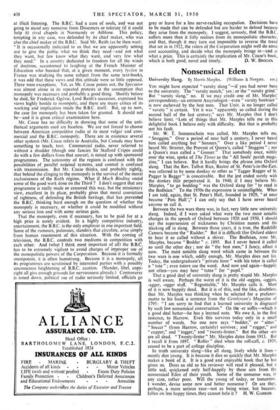Nonsensical Eden
University Slang. By Morris Marples. (Williams & Norgate. ios.)
You might have expected " varsity slang "—if you had never been to the university. The " varsity match," yes ; or the " varsity grind." But " varsity slang," no. If we may credit one of Mr. Marples' correspondents,—an eminent Assyriologist—even " varsity boatrace " is now eschewed by the best men. That Univ. is no longer called " varsity " is certain. Yet it was " apparently so called during the second half of the last century," says Mr. Marples (but I don't believe him). "Lots of things that Mr. Marples tells me in this delightful book I believe only with difficulty. But that is probably not his fault.
Mr. W. T. Sonnenschein was called, Mr. Marples tells me, " Snuggins." Over a period of near half a century, I never heard him called anything but " Sonners." Over a like period I never heard Mr. Streeter, the Provost of Queen's, called " Stuggins " ; nor a Queen's man called a " Gooser." That somebody once, wittily over the wine, spoke of The Times as the " All Souls' parish maga- zine," I can believe. But it hardly brings the phrase into Oxford slang. That the Rev. Talbot Rice, Rector .of St. Peter's-in-the-East, was referred to by some donkey or other as " Tagger Ragger of St. Pagger le Bag&er " is conceivable. But the jest ended surely with the donkey tat perpetrated it. In 1940, if 1 may 'believe Mr. Marples, " to go bodding " was the Oxford slang for " to read in the Bodleian." To the 1950s the expression is unintelligible. When I am told, again, that St. Peter's Hall, founded in 1929, " at once became Pots Hall '," I can only say that I have never heard anyone so call it.
Between the two wars there was, in fact, very little new university slang. Indeed, if I were asked what were the two most notable changes in the speech of Oxford between 1920 and 1950, I should say the supersession of nicknames by Christian names and the slacking off in slang. Between those years, it is true, the Radcliffe Camera became the " Radder." But it is difficult (for Oxford elders) to hear it so called without a shiver. The Bodleian, teste Mr. Marples, became " Bodder " c. 1895. But I never heard it called so until the other day ; nor do " the best men," I fancy, affect it now. The most notable slang word which came in between the two wars is one which, oddly enough, Mr. Marples does not list. Today, the undergraduate's " private hour " with his tutor is called a " tute " ; even tutors use the word. And now and again—happily not often—you may hear " tutee " for " pupil." That a good deal of university slang is pretty stupid Mr. Marples is well aware. Perhaps the worst of it is the old -oggins, -uggins, -agger, -ogger stuff. " Regrettable," Mr. Marples calls it. Most of it is now happily dead. But it is of this, and the like, doubtless, that Mr. Marples was thinking when he selected for a prefatory motto to his book a sentence from the Gentleman's Magazine of 1795: " I am sorry to find that a learned university is disgraced by such low nonsensical conversation." On the -er suffix—which is a good deal better—he has a learned note. We owe it, in the first instance, to Harrow. Eveii this survives today only in a small number of words. No one now says " bedder," or " sitter." " Soccer " (from Harrow, certainly) survives ; and " rugger," and " cupper," and " togger," and " twenty-firster." But the other -ers are all dead. " Twenty-firster " Mr. Marples dates from 1913. But I recall it from 1897. " Roller " died when the roll-call, c. 1939, ceased to be a part of college discipline.
In -truth university slang—like all slang, lively while it lives— mostly dies young. It is because it dies so quickly that Mr. Marples makes a book of it. It is a good and enjoyable book that he has given us. Dons as old as his reviewer will read it pleased, but a little sad, quickened only half-happily by these airs from the nonsensical Eden of their youth. Some of the nonsense was, in any case, rather poor. Will the young of today, or tomorrow, I wonder, devise some new and better nonsense ? Or are they, perhaps, a more serious race—not as being wiser, but because, fallen on less happy times, they cannot help it ? H. W. GARROD.






































 Previous page
Previous page